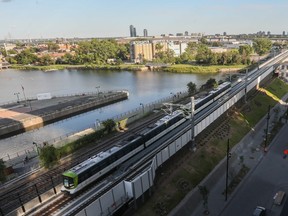An expert examining Montreal’s transit funding says it is up to the province and the federal government to help stop the bleeding of cuts in the city’s transit system.

Article content
The Montreal region’s transit funding woes are likely to get worse before they improve, experts said Monday.
Speaking to the city council’s permanent commission on budget and administration, David Cooper, the principal at the consulting group Leading Mobility, warned that the city’s main transit agency is in a downward spiral.
Article content
“Really, the time to act is now,” Copper told the hearings at a conference centre downtown. “I don’t think it’s helpful for anyone to have this yearly conversation of a budget shortfall and fiscal issues with your transit system. It’s really inhibiting your ability to expand service and make it something that people would like to take as much as possible.”
Advertisement 2
Article content
Cooper said the province and city must work out a way to fund transit in the long term in order to allow transit systems to plan for increasing their service levels. The city had asked for a five-year plan from the province, and recently received a one-year commitment.
At the moment, ridership is still below prepandemic levels, and the Agence régionale de transport métropolitain, the region’s governing transit body, is facing a $700-million shortfall in the coming years if there is no change, Cooper said. His report, This is the End of the Line, published last week, found all major cities in Canada are facing shortfalls, but the one in the Montreal region is the most pronounced.
Already, the STM has cut its bus service, by retiring 155 buses, and axed its 10-minute max service.
“I think you’re in that vicious circle,” he said. “If you don’t deal with these core components, you’re going to see more service cuts.”
He added that part of the problem is that the provincial and federal governments have paid to help build the new Réseau express métropolitain, but have not added money to operate the new system.
Article content
Advertisement 3
Article content
Earlier in the day, STM chairperson Éric Caldwell denounced this same phenomenon, and said it will get worse as the REM expands its full operations next year, with service along the Deux-Montagnes Line and towards Ste-Anne-de-Bellevue.
Caldwell said there are two competing funding arrangements in the metropolis right now: one for the REM, which bills the province on a per-passenger basis, and one for the rest of the transit agencies, which relies on a handout from the province. He said the agreement with the Caisse de dépôt et placement du Québec, which owns and operates the REM, will see its provincial funding increase as it gains ridership, while the STM and other transit authorities will have to rely on a steadily decreasing pot of money from the province to pay for their operations.
“The deal with the arrival of the REM was to increase service, not to degrade the rest of the (transit operators),” Caldwell said. “The REM is a wonderful service, but when we make choices like this to increase an offer of service without taking into account the cost of operating it, it’s a problem. And when those costs amputate the classic service, then it’s an even greater problem.”
Advertisement 4
Article content
He pointed out that when fully up and running, the REM will only transport 170,000 people per day, compared with the STM that transports 1 million per day.
However, not everyone is convinced that the all the solutions for transit funding lie with the province.
Speaking for the business community, Michel Leblanc said the record level of debt within the city is alarming, and needs to be addressed before asking the province to chip in more.
Leblanc said the city’s payroll is bloated, but it continues to hire more employees, while citizens have not seen any improved services resulting from that increased payroll.
“If the city had the same level of pay as the average Quebec provincial civil service, it would have $723 million more for 2024,” said Leblanc, who is the president and CEO of the Chamber of Commerce of Metropolitan Montreal.
He the city should address its own financial issues before running to the province to ask for more money.
Recommended from Editorial
Advertisement 5
Article content
Article content




